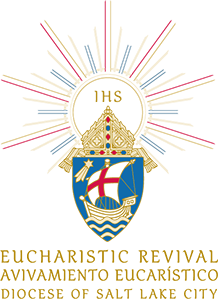Reflection on the Mass - The Liturgy Of The Word, Part I
(Editor’s note: This is one in a series of reflections on the importance of the Eucharist and what it means to be a Eucharistic people. These reflections are part of the Diocese of Salt Lake City’s participation in the National Eucharistic Revival, which began June 19 and will end in July of 2024 with the National Eucharistic Congress in Indianapolis. These reflections are designed to be read aloud at Mass by a priest, deacon or experienced minister following the Prayer after Communion. They will appear in print in this newspaper and on the diocese website, www.dioslc.org. The series of reflections will continue through June of 2023 in preparation for the July 9, 2023 Diocesan Eucharistic Rally at the Mountain America Expo Center in Sandy.)
Imagine you are meeting up with a friend you have not seen for a long time. The two of you have agreed on a time and place to meet and now you are looking forward to their arrival. As you arrive at the agreed upon location at the agreed upon time, you begin to see your friend in the distance approaching you.
At first, they are too far away for you to clearly see them or hear them. As they get closer, you can start to make out the details of their figure and you recognize that it is, in fact, your friend. Eventually, they get close enough to where you can shout at them and they can shout out at you, and you can understand what they are saying. Clearly, this isn’t enough. You want to get close enough to where you can look into their eyes, hug them, and spend time with them in close proximity. Still, when we are so excited to see the person, we will make the most of whatever means of communication are available to us at the time. In the Mass, we have come to the agreed upon place and time to meet Christ in the Eucharist, and like our friend, throughout the Mass, Christ approaches us gradually.
In previous reflections, we covered the introductory rite and the penitential rite, in which we can start to recognize the presence of Christ, but when we move into the next part of the Mass, the Liturgy of the Word, Christ’s presence becomes that much clearer when we can actually hear him.
The Liturgy of the Word also reminds us that the Mass, from beginning to end, is a reliving of Salvation History in its entirety, from the events of the Old Testament to the events of the Gospels. This is made evident in one way through the active rituals we perform during Mass but is made most evident in the Liturgy of the Word through the readings from the Old Testament, the Psalms, the New Testament and the Gospels.
For each individual Mass we go to, the readings have been carefully ordered so that we can clearly see exactly how Christ fulfilled what was written in the Old Testament. When you look at the readings for the day, you should be able to find a theme that is present throughout them all.
After the first and second readings, the lector will say, “The word of the Lord.” Our response, “Thanks be to God,” acknowledges that these readings are messages from God directed to us, the congregation. It should speak to us just as much as it spoke to the Christians of the past, and it will continue to speak to the Christians who carry on the faith into the future.
God’s word is not like our word; it has the power to create and to transform merely by him speaking. What we find profound in the readings of the day and what we take away from the readings reveal that transformative power being done within us.
The Responsorial Psalm brings us back to the Jewish worship practice of singing psalms continuously throughout their sacrificial rituals. The Catholic Mass is, after all, a continuation of Judaic rituals (from the study of scripture in the synagogues to the sacrifices performed in the temple). This further emphasizes that Christ did not come to abolish the law, but to fulfill it.
The second reading usually comes from the epistles of St. Paul, which were letters addressed to different early Christian communities, or from the Acts of the Apostles about the earliest days of the Christian message being proclaimed. By hearing these letters and their messages again, we are receiving the same words that the very first Christians heard when they gathered for the Sacrifice of the Mass and the Eucharistic feast.
© Copyright 2024 The Diocese of Salt Lake City. All rights reserved.


Stay Connected With Us